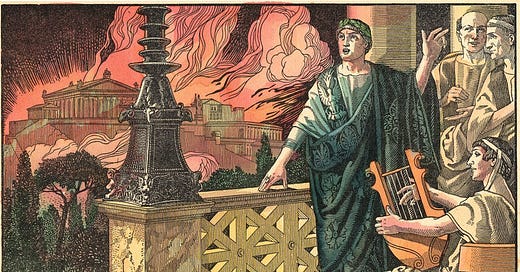Some Roman Emperors had a servant follow them around whispering ‘You are mortal’, to keep them down to earth and well adjusted. Not Nero. He was one of the crazy ones.
Nero Claudius Caesar Augustus Germanicus was famous for never wearing the same tunic twice. Not only was he said to have fanned the flames of the Great Fire of Rome to clear land for a new golden pleasure palace, but he spent most of the catastrophe singing and fiddling in the direction of the blaze. Yikes.
There’s a lot old Nero and I might have disagreed on—fratricide, tyranny, torture, neckbeards, fast fashion, and city-wide arson, to name a few. But we would have shared a great love for the Olympics.
The Ancient Olympics was centuries old when the mad man came to power in 54 AD. Nero was a poet and a charioteer, obsessed with the Greek myths and desperate for personal glory. Signing up to compete was a no brainer.
Though he had some scheduling conflicts, Nero was the kind of guy who made things happen for himself. By simply threatening the organisers with the wrath of the Roman army, one of the greatest conquering forces in the history of human civilisation, he was able to get them to stretch the historically, famously, fundamentally four year Olympiad out to five (or ‘an even V’ as it was known at the time) to better work around his calendar.
Nero’s big problem—though he did admittedly have a lot of other major political and personality problems—was that he wasn’t an athlete. He was an aristocrat. A sculptor. A lyre-playing pretty boy. Even with the coffers of Rome to bribe the judges with, he wasn’t going to thrive in the running races, or the discus, or the very long list of Old World combat sports.
And to that Nero would ask, so what? Why even be the Emperor of Rome if you can’t add singing and poetry to the Olympic schedule, on either side of kickboxing? If the IOC can bring breakdancing to Paris, then Nero bringing the lyre in isn’t so crazy on paper.
And he was surely right to do so, because the Emperor came first in every single event he competed in! A regular Emma McKeon. Poetry: gold! Sculpting: gold! Acting: gold! He entered the four-horse chariot race with ten horses—and, yes, he may have gone too fast and crashed and almost died, but a big fat imperial so what? He was awarded yet another golden laurel as he was dragged bleeding from the wreckage, since the judges declared he certainly would have won if the first corner hadn’t been so tight. It’s hard to disagree with that logic. He had twice as much horse power as the other guys.
The Games of the XXIII Modern Olympiad officially open tomorrow, in Paris, on the 26th of July. Though many a civilization has risen and fallen since his near-death in Olympia, I like to think that the spirit of Nero will always live on in the Games. A fun way to connect the Ancient with the Modern is to imagine how the old neckbearded tyrant might have cheated in any given event.
How much of a headstart would he give himself to beat Arianne Titmus in the 400m freestyle? How long a stick is Nero using to pole vault? Would he bring a fire lance to the fencing?
I love the Olympics, but I know they don’t really have the powers of global harmony that the Games' own marketing collateral would have you believe. The Olympics often leave a Nero-esque trail of economic and environmental destruction in their wake. They have a tendency to highlight, and exacerbate, without actually fixing, systemic racial, gender, and social issues. Corruption in the IOC is almost as bad as it is in FIFA. Plus there’s the doping scandals and darker truths they reveal, the reduction of moments of transcendent physical beauty into a commercial product, and the overplayed myth that, if they can just run and swim fast enough, these vainglorious superjocks might somehow use the Olympic Spirit to fix the many tangible catastrophes that are creeping towards us from all sides.
For me, the Olympics is important because of the way it can make you feel, in your bones.
Like how it feels to witness Simone Biles do things that literally no human being has ever done before.
Like how it feels to watch and become completely invested in the intricacies of a bizarre sport you absolutely didn’t care about before it came on.
Like how it feels to know that most of the eyeballs in the world will, together, watch some vainglorious superjocks run 100 metres and believe that it matters.
For all of Emperor Nero’s faults, and there were many, many faults, he understood this magic of the Games. That’s something we haven’t lost on the journey from Olympia to Paris.
Olympics carefully, fellow citizens.
If you’d like to read another Olympics-themed post that you may have missed from a very long time ago, here’s an old, old story about the beauty of badminton: Who the Hell is Minton and Why Are They So Bad?






I thought it might be worth mentioning that Nero appointed his horse as a senator, but it turns out that was Caligula.